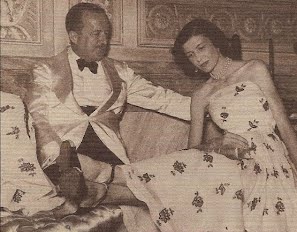A well-played "P.S."
And I think we all can appreciate a well-played "P.S."
"At 86 and 79, [Berkshire CEO] Charlie [Munger] and I remain lucky beyond our dreams.
We were born in America; had terrific parents who saw that we got good educations; have enjoyed wonderful families and great health; and came equipped with a “business” gene that allows us to prosper in a manner hugely disproportionate to that experienced by many people who contribute as much or more to our society’s well-being. Moreover, we have long had jobs that we love, in which we are helped in countless ways by talented and cheerful associates. Indeed, over the years, our work has become ever more fascinating; no wonder we tap-dance to work. If pushed, we would gladly pay substantial sums to have our jobs (but don’t tell the Comp Committee).
Nothing, however, is more fun for us than getting together with our shareholder-partners at Berkshire’s annual meeting. So join us on May 1st at the Qwest for our annual Woodstock for Capitalists. We’ll see you there.
February 26, 2010
Warren E. Buffett
Chairman of the Board
P.S. Come by rail.
"If Berkshire ever gets in trouble, it will be my fault."
I'm kind of biased, because I weirdly enjoy reading SEC filings, but I really think anyone could have a good time leafing through Berkshire's annual earnings report. Warren Buffett writes it himself in a conversational tone, sprinkling in his investment philosophies and personal anecdotes with the required facts and figures. I wish more public companies would follow Buffett's lead in making shareholder updates as interesting as they are informative.
I particularly liked his assertion that a CEO should man up and accept full responsibility for the performance of his (or her) company.
"I believe that a CEO must not delegate risk control. It’s simply too important. ...If Berkshire ever gets in trouble, it will be my fault. It will not be because of misjudgments made by a Risk Committee or Chief Risk Officer.
In my view a board of directors of a huge financial institution is derelict if it does not insist that its CEO bear full responsibility for risk control. If he’s incapable of handling that job, he should look for other employment."
In Defense of Wine

Duff Cooper and Susan Mary Patten in Venice, 1951
"I have already made mention of the happiness I have derived throughout my life from literature, and I should here, perhaps, acknowledge the consolation I have never failed to find in the fermented juice of the grape.
Writing in my sixty-fourth year, I can truthfully say that since I reached the age of discretion I have consistently drunk more than most people would say was good for me. Nor do I regret it. Wine has been to me a firm friend and a wise counsellor.
Often, as on the occasion just related, wine has shown me matters in their true perspective, and has, as though by the touch of a magic wand, reduced great disasters to small inconveniences. Wine has lit up for me the pages of literature, and revealed in life romance lurking in the commonplace. Wine has made me bold but not foolish; has induced me to say silly things but not to do them. Under its influence words have often come too easily which had better not have been spoken, and letters have been written which had better not have been sent.
But if such small indiscretions standing in the debit column of wine’s account were added up, they would amount to nothing in comparison with the vast accumulation on the credit side."
-from Duff Cooper's 1954 autobiography Old Men Forget
Whether you're a drinker or not, it's refreshing to read an old fashioned, unapologetic defense of indulgence of any kind in this age of juice cleanses and detox diets.
The poem the Adorable One slipped into your pocket
This marks my second annual posting of poetry around Valentine's Day.
You might notice that the flowery, "read at your wedding" types of poems are never my favorites. This was actually a problem recently, when I was looking for material to be read my own nuptials-- all the literary things I truly like are melancholy! (We ended up not having any readings at all.)
But, I can only hope that the stripped-down expressions I favor resonate with those who are weary of all the lovey-dovey stuff that abounds at this time of year.
Tonight I'm sharing a longtime favorite from Mark Strand, first published in the October 20, 1997 issue of the New Yorker. Maybe it'll encourage one of you dear readers to make a much-needed move (romantically, socially, career-wise, whatever) well before "the moment it serves no purpose at all."
Untitled
by Mark Strand
As for the poem the Adorable One slipped into your pocket,
Which began, "I think continually about us, the superhuman, how
We fly around saying, 'Hi. I'm So-and-So, and who are you?'"
It has been years since you bothered to read it. But now
In this lavender light under the shade of the pines the time
Seems right. The dust of a passion, the dark crumble of images
Down the page are all that remain. And she was beautiful,
And the poem, you thought at the time, was equally so.
The lavender turns to ash. The clouds disappear. Where
Is she now? And where is that boy who stood for hours
Outside her house, learning too late that something is always
About to happen just at the moment it serves no purpose at all?